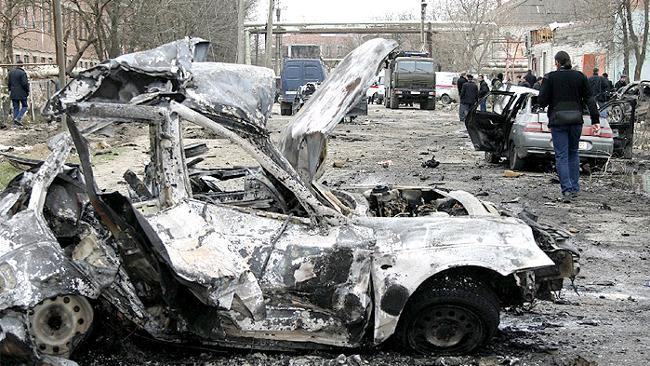
The Specter of Suicide Bombing Haunts the North Caucasus
Publication: Eurasia Daily Monitor Volume: 7 Issue: 166
By:

Just four days after the September 5 suicide bombing in Buinaksk, Dagestan, reportedly carried out by Zamir Terekbaev, a 26-year-old resident of the village of Andrei-Kurgan in the Neftekumsky district of Russia’s Stavropol region, originally from Dagestan, a powerful blast rocked Vladikavkaz, the capital of North Ossetia on September 9. It killed 17 people and wounded 156 more people (https://gazeta.ru/news/lenta/2010/09/12/n_1546230.shtml). The suicide bomber, or shahid, bombed a crowded marketplace in the center of Vladikavkaz. The place itself was purposely chosen to inflict as many casualties as possible; the major difference between the two recent bombings in Buinaksk and Vladikavkaz. In Buinaksk, the shahid set himself the goal of striking a military garrison and servicemen deployed there while trying to completely avoid collateral casualties among the local civilian population. In contrast, the suicide bomber in Vladikavkaz gave no consideration to whether his victims would be military and law enforcement officers (the siloviki) or civilians.
This principal difference clearly shows that each Islamic jamaat group sees the role and fate of the civilian population in its own way. Some see the civilians as their family members, relatives, neighbors and friends while others consider them as collaborators with the Russian siloviki, which gives them a justification for their indiscriminate attacks against the civilian population. The rebel tactics would hardly find understanding among the North Caucasus population. For instance, last year, when suicide attackers conducted a series of bombings throughout Chechnya, the local population was outraged at their actions directed not only against the siloviki but also against the local residents who accidentally became victims. Hiding behind the flag of Islam and fighting against the siloviki, the jamaat members risk losing the small support they still enjoy today despite the real dangers to which the Russian authorities subject not only those who assist the rebels but also those who merely sympathize with the armed resistance movement in the North Caucasus. The Russian Federal Security Service (FSB) is often alleged as being behind suicide attacks, but subsequent statements made by rebel leaders announcing that a particular action was a successful rebel operation creates a deadlock as to who wants to be associated with such acts against a civilian population.
The Russian Prosecutor General’s investigative committee categorized the suicide bombing in Vladikavkaz as a terrorist act. According to the siloviki, the power of the explosive device was equal to 40 kilograms of TNT. The investigators went further by declaring that the explosives detonated at the Vladikavkaz market on September 9 and the military base at Buinaksk four days earlier were identical (https://actualcomment.ru/news/15446/). This announcement hardly deserves any credibility. If it were true, then an entire plant producing explosive equipment for the rebels and a network distributing them all across the North Caucasus existed, an unlikely assumption. The investigators also rushed to the conclusion that the suicide bombing in Vladikavkaz was organized by the so-called Ekazhev Jamaat (www.mk.ru/politics/article/2010/09/10/528813-neulovimyiy-doku.html) which does not exist in reality. So far, there have only been indirect statements on the Ingush Jamaat’s website indicating that the jamaat was involved in the bombing (https://hunafa.com/?p=4038#more-4038). No doubt an announcement will be made as to who helped organize the suicide bombing attack in Vladikavkaz.
It is worth remembering that this was not the first time the Vladikavkaz central market was bombed. On April 28, 2002, an explosion there killed 10 people and wounded 40. The alleged perpetrators of the earlier terrorist acts were Ruslan Chakhkiev and Movsar Temirbiev. They had come from the village of Kartsa in North Ossetia, which is populated mostly by ethnic Ingush. The two men were captured and sentenced in July 2002. Chakhkiev was sentenced to 24 years in prison and Temirbiev to 18 (https://politforums.livejournal.com/2922655.html). According to unofficial information, the latest blast in the Vladikavkaz market is the fifth over the past ten years, not to mention the horrendous tragedy in the neighboring town of Beslan where Russian special forces became the primary reason for the deaths of 330 people, including 172 children, during a special operation on September 3, 2004 aimed at freeing hostages taken by militants from a unit headed by Shamil Basaev.
It is not surprising that on September 11 of this year, several hundred people spontaneously gathered in a square in front of the local government headquarters in Vladikavkaz to demand security and protection for the population against terrorist attacks. The authorities were not ready to respond to the request of the crowd so the protesters decided that they would meet again at the same place a few days later (www.kavkaz-uzel.ru/articles/174124/).
The recent tragedy in Vladikavkaz was met by authorities with unusual political correctness. There were no collective accusations against all Ingush and no one officially referred to the suicide bomber’s ethnicity even though the investigation noted right away that the bomber came from the neighboring republic, Ingushetia. Moreover, the North Ossetian leader, Taimuraz Mamsurov, asserted that the bombing was an attempt to split society – something he said he would not allow to happen in his republic.
The latest bombing is not likely to have any consequences since the government wants there to be as little noise as possible surrounding these types of incidents. That is why the prediction by some analysts that the Vladikavkaz bombing would in some way change the general picture in the already politically unstable North Caucasus region is a clear overstatement. Leaving aside the human tragedy, for the militants, this bombing was simply one among many operations. However, this particular incident was a brazen attempt by the jamaat to split society, to compel people to live in constant anticipation of danger and to show the helplessness of the authorities in the face of rebel actions. At the same time, it should not be underestimated that North Ossetia is a key territory in the North Caucasus, including in the context of the political decisions made by Russia during its military invasion of Georgia in August 2008. Ossetia thus remains an attractive swath of land both for the Russian authorities and for the rebels but neither has so far succeeded in substantially changing the situation on the ground to their advantage.




